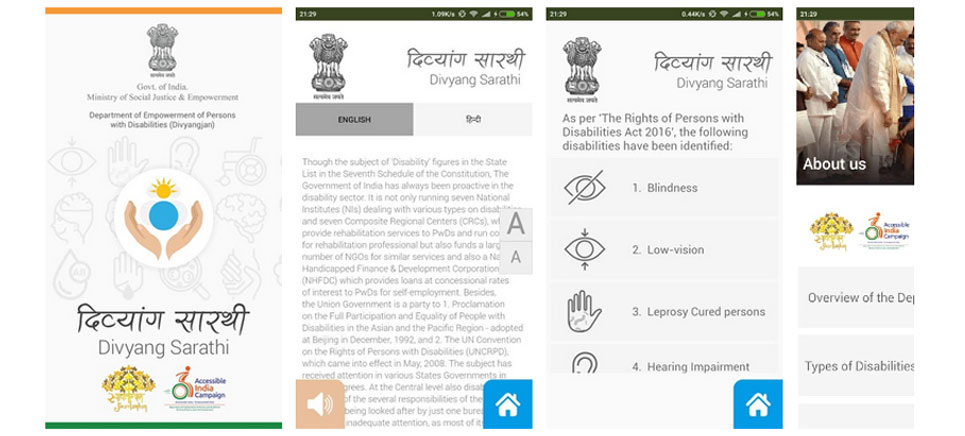You might have heard about the Divyang Sarathi Mobile App of the Government of India. The beta version of the app was launched in September 2017. This comprehensive and accessible mobile application has been designed to provide all relevant information related to the Department of Empowerment of Persons with Disabilities (Divyangjan). Let us give you an insight into the app and how it might be useful for you if you are a PwD residing in India. We would also be sharing our evaluation of the app.
Salient Features of the Divyang Sarathi Mobile Application
The most obvious special feature of the app is its accessibility. The user can set the size of the texts to make them easier to read. Further, there are audio notes embedded in the app so that the application can read the written text out loud.
The next special feature of the app is its bilingualism – the information is available in English as well as Hindi.
And finally, the application can be used by an android user even if there’s no access to the internet, once it has been installed.
Limitations of the Divyang Sarathi Mobile App
Though the mobile application is a good initiative, it is far from being perfect. There are certain limitations that should be taken care of in the subsequent updates to the app.
There’s no scale or text size setting to make the text appropriate according to the need of the user. You cannot set the text size permanently. The app basically provides the user the option to zoom-in and zoom-out the text with a tap. Every time you open the app you’ll find the texts to be of the default size. Even while navigating from one page to the other, you’ll need to change the text size.
Audio notes and bilingualism of the application too fall short of the promise. There’s no option to set the language of the application to Hindi or English. The application is basically in English with a Hindi translation of a few ‘select’ pages. You don’t get a Hindi version of all the pages. The embedded audio files too are present only for a few select pages, that too in English only. The voice that reads the audio files is too mechanical. Moreover, you don’t get to select any particular part to be read out loud. Either you have to listen to the entire page or read it by yourself.

The application is available offline but some of the pages take forever to load even if your mobile has access to the internet. (We failed to open sections of ‘The Acts, Rules, Regulations, Guidelines and other notifications’ while writing this article).
What are the information available in the Divyang Sarathi Mobile Application?
When you open the application you find three sections:
- About us
- Acts, Rules, Regulations, Guidelines and other notifications
- सूचना
Further when you click on ‘About us’ three sub-sections will appear:
- Overview of the Department
- Types of Disabilities covered
- Contact us
The Contact us section can be useful if you need the official telephone number of the Secretary, Joint Secretaries, Deputy Secretaries and Under Secretaries of the Department of Empowerment of Persons with Disabilities.
Types of Disabilities covered section is just a list of names of the 21 types of Disabilities covered under the RPWD Act, 2016. You can check the list with added details at WeCapable as we have already covered it.
The Acts, Rules, Regulations, Guidelines and other notifications section have 15 topics (none of them could load when we tried). Anyway, we are listing the heading of the 15 topics here.
- Guidelines for evaluation and assessment of Autism and procedure for certification
- Guidelines and space standards for the barrier-free built environment for disabled and elderly persons.
- Guidelines for the evaluation of various disabilities and procedures for certification.
- Guidelines Relating to National Anthem.
- Incheon Strategy to “Make the right real for persons with disabilities in Asia and the Pacific”.
- The National Trust Act 1999. Rules and Regulations
- The National Trust Rules 2000
- Guidelines for conducting written examination for persons with disabilities.
- Persons with Disabilities act 1995 rules
- Persons with Disabilities act 1995, rules amended 2009
- The Rehabilitation Council of India Act 1992
- The Rights of Persons with Disabilities act 2016
- The Rights of Persons with Disabilities act 2016 rules
- The National Trust for the Welfare of Persons with Autism, Cerebral Palsy, Mental Retardation and Multiple Disability Act 1999 regulations
- The UN Convention on the Rights of Persons with Disability
The सूचना section seems to be the most useful. The information listed here includes –
- Schemes
- Scholarships
- Outreach Institutions
- Employment Opportunities
- Disability Market
But, as mentioned above as a limitation, many of the pages just don’t load even after waiting for several minutes.
The thoughts and intention behind the creation of the Divyang Sarathi Mobile App is appreciable. But, it fails miserably in keeping most of its promises. We hope that the glitches will be taken care of in the subsequent updates of the app.
Use the citation below to add this article to your bibliography
"Divyang Sarathi Mobile Application: An Evaluation of Features." Wecapable.com. Web. June 7, 2025. <https://wecapable.com/divyang-sarathi-mobile-app-features-evaluation/>
Wecapable.com, "Divyang Sarathi Mobile Application: An Evaluation of Features." Accessed June 7, 2025. https://wecapable.com/divyang-sarathi-mobile-app-features-evaluation/
"Divyang Sarathi Mobile Application: An Evaluation of Features." (n.d.). Wecapable.com. Retrieved June 7, 2025 from https://wecapable.com/divyang-sarathi-mobile-app-features-evaluation/

Leave a Reply